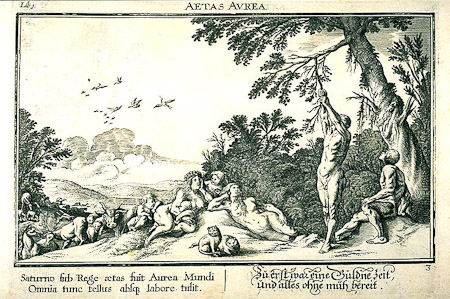
Artist Johann Whilhelm Baur (1600-1640), Nuremberg edition, 1703.
To this point the lower forms of animals had lacked the capacity for higher thought. Now appeared man, a more blessed creature, to rule them.
Perhaps the creator of all things grew him from a divine spark to bring about a better world, or alternatively perhaps the Earth, freshly penetrated by the high Aether, retained the seeds of her heavenly kinsman. Yet again perhaps Prometheus, the son of Iapetus, mixed earth dampened with rainwater into an image of the gods who rule all things.
Other animals go on all fours, looking down at the earth. Prometheus made man to carry his head high and behold the heavens, standing erect and raising his face to the stars. The world, which had been unshaped and without form, began to change when men first appeared.
The first age to arise was one of gold. There were no lawyers because without need of laws every man worshipped faith and righteousness by his own will. There were no threatening words fixed to bronze tables in the Forum, nor did suppliant throngs fear the face of their judge: they were safe without a lawyer.
Not yet was the pine tree cut from its native mountain to plunge through the flowing seas on the way to a foreign shore. Not yet did sheer walls ring cities, not yet were there straight trumpets or curved horns, not yet helmets nor swords: men lived secure in peaceful leisure without the need of soldiers.
Earth herself was untouched by hoes and free from the wounds of plowshares, but she gave forth crops of her own will. Men were happy to gather meals that grew without compulsion: tree strawberries, the mast of mountain beeches, dogwood berries, blackberries from their thorny thickets, and the acorns which fell from Jupiter’s broad-spreading oak.
Spring was eternal, and warm Zephyrs mildly caressed the self-seeded flowers. The unplowed earth bore crops in quick succession, so that the fields again and again grew white with heavy-headed grain. The rivers ran with milk, the rivers ran with nectar, and golden honey dripped from the green ilex tree.
Afterwards Saturn was exiled to shadowed Tartarus and the world fell under Jupiter. A silver race arose: not as fine as its golden predecessor, but better than the gleaming bronze to come. Jupiter shrank the eternal springtime so that fall and a truncated spring separated the winter and summer quarters.
Then for the first time the glowing air burned with roiling thirst, and ice congealing from the wind hung from high places. Men sheltered in homes, which at first were caves, dense thickets, and huts of bark woven over poles. Then for the first time grain was seeded in long furrows and oxen groaned under the weight of the yoke.
They were followed by a third race of bronze, more violent in temperament and quicker to take up bristling arms. Nevertheless they were not vicious: that was left for the final age of iron.
Into that age of lesser metal burst ever sort of crime. Shame and truth and faithfulness fled, their places taken by frauds and plots and treachery and violence and a shameless lust for having.
The iron race raised sails to winds which the sailor had never before known; keels which previously had been trees standing on high mountains now danced in unexplored waves. The earth which before had been held in common like the light of the sun and the breezes, was now laid out in long tracts by the careful surveyor.
Men made further demands on the earth, not for crops and needful sustenance this time but to burrow into her bowels. The riches she’d hidden in the Stygian darkness were dug out, incitements to evil. Harmful iron and gold more harmful than iron came to the fore. War arose, fed by both, and rattled weapons in its bloody hand.
Men live by rapine. Neither is the guest safe from his host nor is the father-in-law safe from his son-in-law; friendship between brothers is rare. The husband threatens death to his wife and she to her husband; horrible mothers-in-law grind pallid aconite, and the son plans an early end to his father’s life.
Piety lies conquered, and starry Justice leaves the bloody earth for the far reaches of the heavens.